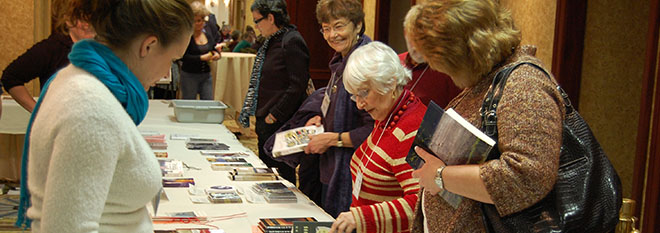Murphy Writing of Stockton University Presents

This entry is part of Getaway Reads, an e-mail series curated by Marissa Luca that features the writing of the Winter Poetry & Prose Getaway faculty.
Long-Distance Call

by Anndee Hochman
My cell phone doesn’t ring that often. Especially not at 7:40 a.m. So when the phone—parked near my feet on the coffee table while I nestled on the couch with my laptop—began to buzz one recent morning, I had to look.
The caller ID said “Dad.”
That would have been odd under any circumstance. My father owned a cell phone only at my mother’s insistence; he never charged the device and rarely carried it. I doubt he even knew the number.
But also, as of that winter morning, he had been dead for 20 months.
I watched as the phone pulsed. “Dad. Dad. Dad.”
I do believe people occasionally send messages from beyond, that unmapped field where soul somehow meets soul. How else to explain why my friend Claudia’s watch stopped at the exact moment her mother died, even though Claudia was on a cruise, her watch locked in the ship’s safe-deposit box, while her mother took her last breath in a hospital outside Philadelphia?
How to account for the smoke that spiraled from a wastebasket after Sarra begged for a sign from her friend who’d died of AIDS; or the see-through sprite, the figure of a young boy, who clambered up a dresser and vanished before my partner’s astonished eyes?
But I don’t believe the dead dial direct. And anyway, while we buried my father with a miscellany of keepsakes—family photographs, a Miracle League baseball cap, a pocketful of ceramic hearts on which we’d written messages in Sharpie marker—we did not tuck the Samsung Galaxy into his casket.

The phone continued purring against my foot. “Slide to answer,” instructed the bubble. For one hot, spooked second, I imagined pressing my thumb to the screen and hearing my father’s pebbly Brooklyn twang—the voice that answered the phone, “H’yellow?” and told me, between gasps, just before doctors inserted the ventilator tube, “I love you so much, and I’m so proud of you.”
Once, I mailed a postcard to my parents from Zihuatanejo, Mexico. It took 13 months to arrive. Could this be similar—an old phone message, initiated more than a year ago and archived in that amorphous Cloud, only now worming its way to the light? A ghost pocket-call triggered by an atmospheric blip? Or perhaps a cruel hoax perpetrated by some basement-dwelling telecommunications troll?
My sense of reason had pretty much dissolved. Still, I thought, if the source were a mean-minded stranger, wouldn’t the caller ID signal “unknown”? Some imposter could pose as my father, I guess, but only one contact in my cell phone’s queue said “Dad.”
In an episode of “Black Mirror,” a speculative and satirical British TV anthology my daughter recently discovered, a woman whose fiancé dies in an accident learns of a website through which she can contact her sweetheart. The site mines every bit of the dead person’s digital lore—every email, text and social media post—then uses that data to generate characteristic responses.
At first, the grieving woman finds the idea bizarre, even repugnant. But once she realizes that she’s pregnant (of course), she’s desperate to share that news with her beloved. She clicks on the link. She emails a tentative hello. And her lover emails back, with all his familiar wry humor and idiosyncratic turns of phrase. The messages sound so like him that she takes the next step and orders an avatar—again, extrapolated from her sweetheart’s digital footprint.
It comes in a large cardboard box: a scrum of pale, stiff limbs that need to be reconstituted, like sea monkeys, in a warm tub. After a finger-biting 20 minutes, a man emerges from the bathroom—a little wan, a little shy, but looking and talking and acting just like the dead fiancé.
The woman realizes she’s treading on perilous turf. She can’t help herself. It’s not so much denial—she was at the burial; she wore the black dress—as desire, a ferocious, beyond-all-sanity yearning to see that person again.
I get it. What wouldn’t I trade for one more moment cocooned in my father’s arms, one more foxtrot at a family bar mitzvah with him counting softly in my ear, one more email tapped out in his signature rat-a-tat rhythm?
You can guess what happens in the TV show. Gradually, the woman realizes that this walking, talking replica of her beloved isn’t really him. There’s verisimilitude, down to the V-necked sweaters and the inside jokes. But something’s missing. He can only say what he’s said before, only do what he’s already done. She’ll change. He’s stuck.
Eventually, that truth drives her literally to the brink. She lures fake-fiancé to a cliff where they used to picnic and walks him right out to the grassy edge. The camera zooms down on surf roaring over toothy rocks below. She grimaces. He pleads. The screen snaps to black.
Then the story fast-forwards a decade. The in-utero babe is now a pre-adolescent, celebrating her birthday and begging mom to go visit “the man who lives upstairs.” Ah, she couldn’t kill the avatar after all—just stowed him in the attic, where he looks pretty good for ten years’ gone.
The dead stay dead. That’s the awful, incontrovertible grief of it. They do not show up at your door with a pint of blueberries that just happened to be on sale at Wegman’s. They never meet you for coffee at the farmers market on a Friday morning and insist on paying, even though you are 53 years old. They never write a card that ends, “I love you to the stars and back.”
They do not call.
I answered the phone. What else could I do? And the voice I heard, after my shaky “hello?” was treble, not gravel. I remembered: After months of avoiding any of my dad’s possessions, my mother had finally given the cell phone to my 10-year-old cousin Dylan, so she wouldn’t be incommunicado during her 45-minute ride to school. I could hear the clamor of kids’ voices, the grind of a bus.
“Oh, hi. I meant to call my friend,” she said. “I’m sorry.”
I didn’t tell Dylan about my weirded-out tumble of thought after the phone rang. I didn’t tell her how my hand quavered as I picked it up. I said the ordinary thing, the thing we get to say to the ones who are still here.
“That’s OK, sweetie. It’s good to hear your voice.”
© Anndee Hochman. Published in Purple Clover on September 13, 2017.
+ + + + + + + + + +
The Winter Poetry & Prose Getaway and Murphy Writing are programs of Stockton University.
+ + + + + + + + + +
Want to study with Anndee Hochman? Anndee will lead Getting Started with Memoir at our Autumn Writing Getaway, and The Heart and Craft of Memoir at the 2018 Winter Poetry and Prose Getaway.
+ + + + + + + + + +
Anndee Hochman writes features, essays and commentaries about education, health, the arts, religion/spirituality and the wide spectrum of family life, including adoption, reproductive technology and LGBT parenting. In addition to her weekly column, “The Parent Trip,” in The Philadelphia Inquirer, Anndee’s work appears regularly in Purple Clover, Broad Street Review and on WHYY’s Speak Easy site. She has written for O, the Oprah Magazine and Brain, Child: The Magazine for Thinking Mothers. Anndee is the author of Anatomies: A Novella and Stories (Picador 2000) and Everyday Acts & Small Subversions: Women Reinventing Family, Community and Home (The Eighth Mountain Press, 1994). For the past 20 years, she has taught writing to people of all ages in schools, senior centers and a small fishing village on Mexico’s Pacific coast. Her website is www.anndeehochman.com. (Photo credit: Rob Cardillo)
+ + + + + + + + + +
Our Participants Say It Best
“The weekend was truly transformative for me. I was welcomed into circles of conversation with such uniquely diverse writers–an environment that allowed me to stretch and explore new ideas and ask questions. The prompts were superb and allowed me to dive right in. Thank you!”
~ Queenie, The Heart and Craft of Memoir Participant, Ventnor, NJ
Our Philosophy
Escape the distractions of your busy life. Advance your craft and energize your writing with a challenging and supportive Writing Getaway. Join us at one of our upcoming writing retreats and take advantage of plentiful writing time, insightful feedback, good meals and good company. Get Away to Write.
+ + + + + + + + + +





